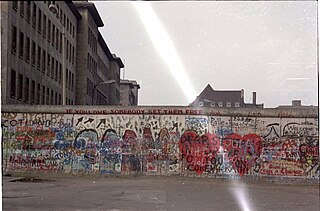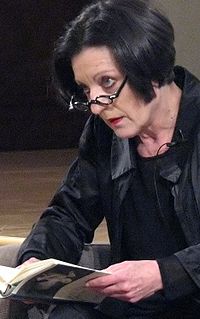
Oskar Pastior was a Romanian-born German poet and translator. He was the only German member of Oulipo.

Nițchidorf is a commune in Timiș County in the Banat region of Romania.

The Land of Green Plums is a novel by Herta Müller, published in 1994 by Rowohlt Verlag. Perhaps Müller's best-known work, the story portrays four young people living in a totalitarian police state in Communist Romania, ending with their emigration to Germany. The narrator is an unidentified young woman belonging to the ethnic German minority. Müller said the novel was written "in memory of my Romanian friends who were killed under the Ceauşescu regime".
The Passport is a novel by Nobel Prize-winning author Herta Müller, published in German in 1986. The German title refers to a saying in Romania. The novel, one of several for which the author was known when winning the Nobel in 2009, tells the story of a village miller in a German-speaking village in the Banat in Romania, who applies for permission to emigrate to West Germany. The novel was published in English by Serpent's Tail in 1989, the first of Müller's novels to be offered in direct translation.
The Appointment is a novel by German author Herta Müller. The novel was originally published in German in 1997 and later in English by Metropolitan Books and Picador, a Macmillan imprint, in 2001. The novel was one of several for which Müller was known when she received the Nobel Prize in Literature in 2009. The Appointment portrays the humiliations of Communist Romania, told from the perspective of a young woman working as a clothing-factory worker who has been summoned by the secret police. She is accused of sewing notes into the linings of men's suits bound for Italy asking that the recipient marry her to help her get out of the country.

Traveling on One Leg is a novel by Nobel Prize-winning author Herta Müller, published in German in 1989 by Rotbuch Verlag. An English translation was made available in 1998.

Nadirs is a collection of largely autobiographical short stories by Romanian-German writer and Nobel laureate Herta Müller. The stories center on life in the Romanian countryside and the violent, oppressive atmosphere of Romania in the mid-20th century.
Drückender Tango is a collection of short stories by Nobel Prize-winning author Herta Müller. It was Müller's second book, published in 1984 in Bucharest. After its publication, Müller was no longer allowed to publish her work in Romania and she moved to Germany. Reviews in Germany had been positive for Drückender Tango, by contrast with the criticism it received in the Romanian press. Today, it has been described as one of Muller's best-known books.
Eine warme Kartoffel ist ein warmes Bett is a collection of essays by Nobel Prize-winning author Herta Müller, first published in 1992. The essays were previously published as columns in the monthly Swiss publication Du between 1990 and 1992.
Der Wächter nimmt seinen Kamm is a book by Nobel Prize-winning author Herta Müller. It was first published in 1993.
Angekommen wie nicht da is a book by Nobel Prize-winning author Herta Müller. It was first published in 1994.
In der Falle: Drei Essays is a book by Nobel Prize-winning author Herta Müller. It was first published in 1996 by Wallstein Verlag. The book consists of essays about the autobiographical poetry of three writers, Theodor Kramer, Ruth Klüger and Inge Müller, who wrote under conditions of dictatorship.
Der fremde Blick oder Das Leben ist ein Furz in der Laterne is a book by German Nobel Prize-winning author Herta Müller. It was first published in 1999. The book has received praise for its persuasiveness and its ability to explain why her Romanian past influences her writing style.
Im Haarknoten wohnt eine Dame is a book by Nobel Prize-winning author Herta Müller. It was first published in 2000. Like many of Müller's books it focuses on Romanian-Germans and their past involvement with Nazism.
Heimat ist das, was gesprochen wird is a book by Nobel Prize-winning author Herta Müller. First published in 2001, the book's title was inspired by Jorge Semprún when he says in Federico Sánchez vous salue bien: "Basically language is not my Heimat, but that which is spoken."
Der König verneigt sich und tötet is an essay book in German by Nobel Prize-winning author Herta Müller. It was first published in 2003. Translations in Polish and Swedish were published in 2005. Following her 2009 Nobel Prize win, interest in her books rose dramatically, and her publisher announced a translation to English was being considered.
Die blassen Herren mit den Mokkatassen is a book of poems and collage art by Nobel Prize-winning author Herta Müller. It was first published in 2005.

The Hunger Angel is a 304-page prose poem by Herta Müller. The English translation is by Philip Boehm (2012).
Vater telefoniert mit den Fliegen is a collection of collage poems by Nobel Prize-winning writer Herta Müller first published in 2012. The 191 collages are divided between five sections. As with most of Müller's work, one of the collection's underlying themes is political, stemming from her experience living under the dictatorship of Nicolae Ceaușescu in Communist Romania.









